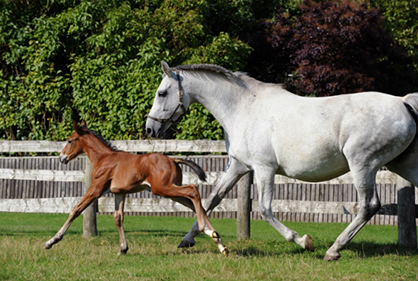Test Tube Foal Born Using Egg Harvested From Mare That Died 11 Months Earlier
By: Brittany Bevis
In the past, the only breeding method available to horsemen was that which had been provided by nature, live cover of a mare by a stallion. Then, in the late 1990s artificial insemination was all the rage. Nowadays, methods of horse breeding sound like they’re straight out of a science fiction movie: Intracytoplasmic Sperm Injection, Gamete Intra Fallopian Tube Transfer, and Oocyte Transfer.
The recent birth of two test tube foals in the United Kingdom took advanced reproduction techniques in the country to a whole new level. The births were part of a three-year collaborative project by the University of Liverpool, the University of Surrey, and Twemlows Stud Farm in an effort to enhance techniques that could benefit rare breed conservation and help horses with fertility problems.
The first foal, Twemlows Simba, was born in June 2015 utilizing Oocyte Transfer. He was the first foal born in the UK utilizing this procedure, which involves oocytes, or eggs, being collected from a donor mare that are transplanted into a surrogate female before fertilization.
The second foal, Twemlows Little ICSI, was born in October using Intracytoplasmic Sperm Injection (ICSI). Already used with great success in human couples suffering from infertility issues, ICSI involves a single sperm that’s injected into an egg in order to create an embryo. The embryo is then transferred to a surrogate female. This technique allows for the potential to create a larger number of offspring from a limited supply of semen or from an individual mare.
What made the case of Twemlows Little ICSI so unique is that the egg was harvested from the ovary of a mare that died eleven months prior and was then matured in a laboratory. This led researchers to contemplate the use of freezing embryos of rare horse breeds to create “a safety net of reserve animals should anything threaten the existing stock.”
Veterinarian researcher at the University of Liverpool, Niamh Lewis, says, “The ability to perform these techniques reliably offers new hope to help overcome various fertility issues in stallions and also provides opportunities to create offspring from valuable mares who have died unexpectedly or cannot conceive in their own right.”
Caroline Argo, a professor at the University of Surrey, adds, “At the moment, we can freeze stallion sperm reliably but not horse eggs or embryos. However, ICSI embryos are smaller and more robust to the freezing process. Now that this method has proved successful, it could be possible to use it more routinely and widely for the purposes of conservation.”
The CEO of the Rare Breeds Survival Trust, Tom Beeston, says, “Breeding numbers of all our native equine breeds continue to decline. If not halted soon our gene bank may be needed to reconstitute a breed; it really is that serious. Being able to freeze embryos as well as semen will mean we can do this completely and faster. This project is by far our best hope of being able to do this soon.”
For more information about the University of Liverpool and this project visit www.liverpool.ac.uk.











